Texas, Adios Blu-ray Movie
HomeTexas, Adios Blu-ray Movie 
Goodbye TexasArrow | 1966 | 92 min | Not rated | No Release Date
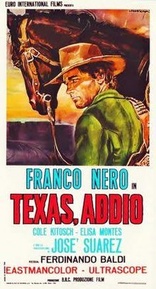
Price
Movie rating
6.4 | / 10 |
Blu-ray rating
| Users | 0.0 | |
| Reviewer | 3.5 | |
| Overall | 3.5 |
Overview
Texas, Adios (1966)
Franco Nero stars as Burt Sullivan, a tough Texas sheriff who heads deep into Mexico with his younger brother to arrest the man who murdered their father years earlier. But when they uncover a shocking family secret, the brothers find themselves trapped in a lawless land where violence is a pastime, vengeance is a birthright and sudden death is a way of life.
Starring: Franco Nero, Alberto Dell'Acqua, Elisa Montés, José Guardiola, Livio LorenzonDirector: Ferdinando Baldi
| Foreign | Uncertain |
| Western | Uncertain |
| Action | Uncertain |
Specifications
Video
Video codec: MPEG-4 AVC
Video resolution: 1080p
Aspect ratio: 2.35:1
Original aspect ratio: 2.35:1
Audio
English: DTS-HD Master Audio Mono (48kHz, 24-bit)
Italian: DTS-HD Master Audio Mono (48kHz, 24-bit)
Subtitles
English, English SDH
Discs
Blu-ray Disc
Single disc (1 BD)
Playback
Region A (B, C untested)
Review
Rating summary
| Movie | 3.5 | |
| Video | 4.0 | |
| Audio | 4.0 | |
| Extras | 3.5 | |
| Overall | 3.5 |
Texas, Adios Blu-ray Movie Review
Reviewed by Jeffrey Kauffman June 9, 2021Note: This film is available as part of
Django 4K + Texas, Adios.
When is a Django film not “really” a Django film? Quite a bit, and maybe even most, of the time, according to a
phenomenon that has already been mentioned on a number of previous “Spaghetti Western” Blu-ray releases, including
The Complete Sartana and
A
Pistol for Ringo & The Return of Ringo: Two Films
by Duccio Tessari, but which is gotten into even more overtly on some of the supplements included on this new release from Arrow. In
one of the kind of strange ironies of international cinema, while Django never made any substantial inroads in the United States market
(at least as a theatrical exhibition), when it was originally released and took off big time in Italy, and then later in West Germany, it created
such a sensation that literally scores of “Django-ized” supposed sequels were produced, though none of them had original star Franco
Nero, and kind of hilariously, many of them didn't even feature a character named Django. It was apparently felt that simply sticking “Django”
either right into the title or at least into some of the marketing materials would more or
less guarantee audiences showing up and buying (coffins full of?) tickets. As is also discussed in some of the supplements, both Django
and A Fistful of Dollars might be vulnerable to
another cheeky kind of question, namely, “When is an Akira Kurosawa film not “really” an Akira Kurosawa film?” As is mentioned in an
archival interview included in this release as a supplement, both Sergio Leone and Sergio Corbucci evidently saw Yojimbo within just a few days of each other in the early sixties, and both then set about more or less
adapting some of the basics of that property in their own ways. The first Django film and A Fistful of Dollars therefore both
exhibit some undeniable similarities, but as is also discussed in some of the supplements, Django is considerably more hyperbolic in a
number of its elements.
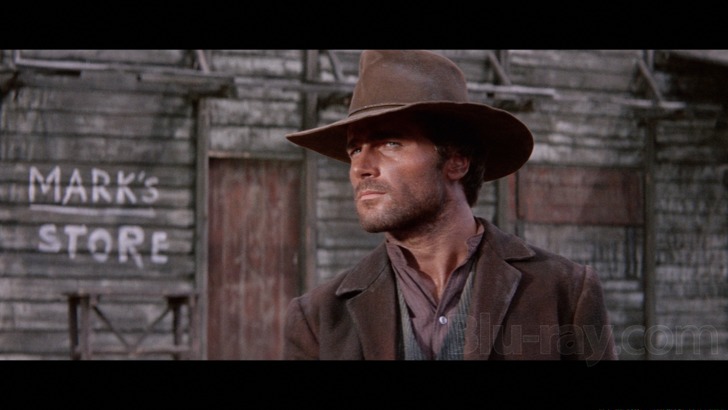
The short answer to that probably cheeky question posed in the opening sentence above could probably be best given with, “When it’s Texas, Adios.” As is covered in the some of the supplements included with this film, after the perhaps stunning success of Django, and the emergence of a Franco Nero as a new Italian superstar, at least some markets saw the completely unrelated Texas, Adios marketed as a Django film, replete with that character’s name in the title and key art emphasizing what might be termed “the Django look”.
Franco Nero is in fact not Django in this film, but instead Sheriff Burt Sullivan, who along with his little brother Jim (Cole Kitosch), travels south to Mexico on a quest for vengeance involving crime lord Cisco Delgado (José Suarez). As Austin Fisher gets into in his analysis of the film, the brothers' eventual involvement with the Mexican Revolution presages a glut of films which were just about to appear (from both Italian and Hollywood producers) which would also depict at least some kind of element involving the Mexican Revolution. But Fisher also sees Texas, Adios as harkening back to such earlier films as Viva Zapata!. One way or the other, this is most definitely not a "Django film" in any real way, and it is in some ways a rather traditional revenge story playing out within a larger political context.
Texas, Adios Blu-ray Movie, Video Quality 
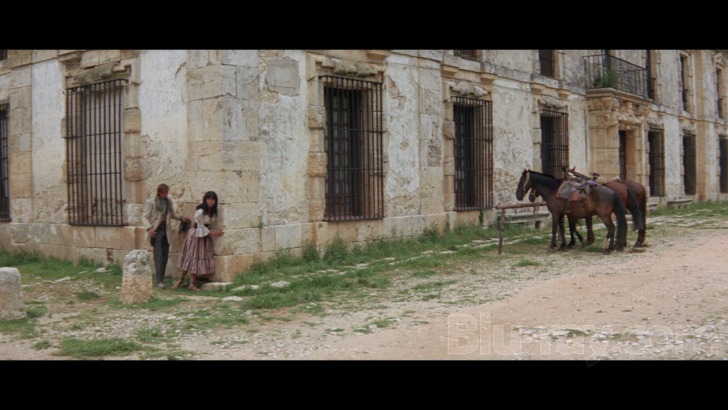
Texas, Adios is presented on Blu-ray courtesy of Arrow Video with an AVC encoded 1080p transfer in 2.35:1. Arrow's insert booklet contains the following information on the transfer:
Texas, Adios is presented in its original aspect ratio of 2.35:1 with Italian and English mono audio.While I can't imagine fans being generally overjoyed with the look of this transfer, Texas, Adios offers a somewhat less pleasing overall appearance than Django, but at least some of these deficits appear to be "baked in". The film's palette is still very impressive throughout this presentation, with generally great densities, though color temperature is still fairly variable. There are some strange moments where things look slightly misshapen or out of focus (see screenshot 8), typically toward the center of the frame, which made me wonder whether the crew was still getting used to Techniscope or if perhaps they had a malfunctioning lens. Also a slightly purplish tint is noticeable in some sequences, and others skew slightly brown. Still, a lot of the outdoor material really pops with a good deal of authenticity, and even midrange shots can support good levels of fine detail. There is one sequence with substantial damage, easily much worse than anything seen in Django. I'm not sure if the wet gate may have contributed to this, but starting around 23:47 there are huge almost waves of what look like emulsion damage, or almost like someone had painted brush or stroke marks on the image. It's inescapable and lasts for about half a minute or so and is the single biggest moment of still evident damage in this presentation. There are several other sudden downturns in quality, like one at around 1:25:30 toward the end of the film, where the element assumes a kind of oily blue look, with a somewhat coarser grain field.
Scanning and restoration work was completed at L'Immagine Ritrovata, Bologna. The original two-perf Techniscope 35mm camera negative was scanned in 2K resolution on a pin- registered Arriscan with a wet gate. Thousands of instances of dirt, debris, scratches, picture instability and other instances of film wear were repaired or removed.
The film was graded on Digital Vision's Nucoda Film Master at R3Store Studios, London.
The mono Italian and English language tracks were remastered from the optical sound negatives. The audio synch will appear slightly loose against the picture, due to the fact that the dialogue was recorded entirely in post-production, as per the production standards of the period.
All original materials used in this restoration were accessed from Surf Film.
Texas, Adios Blu-ray Movie, Audio Quality 
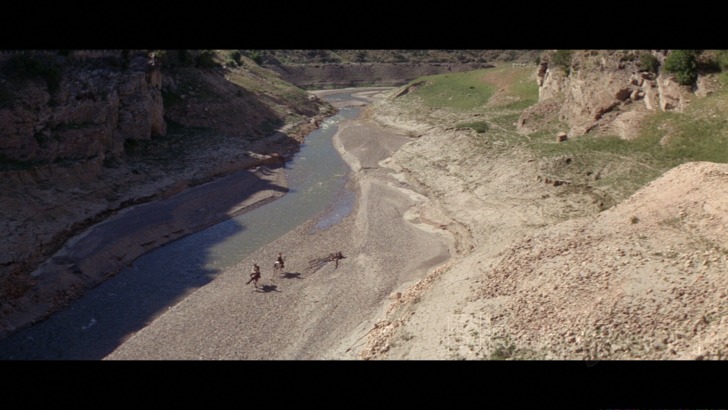
As with Django, Texas, Adios features DTS-HD Master Audio Mono tracks in either English or Italian. While there's not the noticeable difference in amplitude between the tracks that I detected with regard to Django, there's a somewhat muffled tone to the English track which is probably most evident during music cues (just toggle back and forth during the opening credits while the theme is playing and you'll most likely be able to easily hear what I'm trying to describe). Otherwise, though, the mixes are near identical if not absolutely identical, with the obvious exception of voice work.
Texas, Adios Blu-ray Movie, Special Features and Extras 
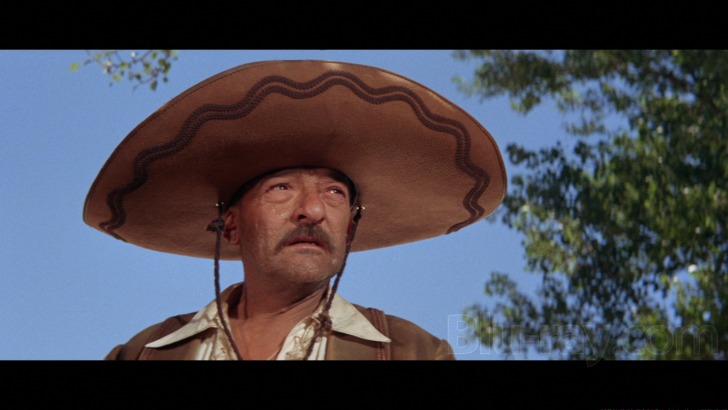
- Audio Commentary with C. Courtney Joyner and Henry C. Parke
- The Sheriff is in Town (1080p; 20:19) continues the interview with Franco Nero that was begun on a supplement included with Django. He has some interesting things to say about this film, including his assessment that it is the most "American" feeling of any of the Spaghetti Westerns.
- Jump into the West (1080p; 33:46) is a new interview with Alberto Dell'Acqua, who appeared in the film under the name Cole Kitosch.
- That's My Life, Part 2 (1080p; 9:19) continues the archival interview with writer Franco Rossetti (Part 1 is on Django).
- Hello Texas (1080p; 16:24) offers Austin Fisher's thoughts on the film.
- Original Trailer (1080p; 2:42)
- Image Galleries are advertised as coming from the Mike Siegel archive:
- Stills (1080p)
- Posters (1080p)
- Lobby Cards (1080p)
- Press (1080p)
- Home Video (1080p)
Texas, Adios Blu-ray Movie, Overall Score and Recommendation 
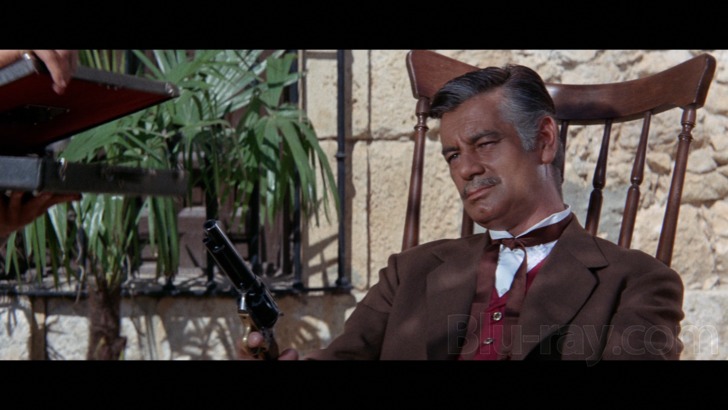
Even divorced from the fact of not being a "real" Django film, Texas, Adios tends to only work in fits and starts, developing some considerable energy at times, only to kind of fritter it away in needlessly slow interstitial scenes. The film still manages to pack a wallop at moments, though, and it's kind of fun to see how marketers managed to extract what amount to snippets in order to try to sell this film as a Django property. Video has a few more blemishes than on Django, but my hunch is fans will still be generally pleased with things. Arrow has once again provided a bunch of really appealing supplements. Recommended.
Similar titles
Similar titles you might also like
(Still not reliable for this title)

Django 4K
Special Edition
1966

The Big Gundown
La resa dei conti
1966

Light the Fuse... Sartana Is Coming
Una nuvola di polvere... un grido di morte... arriva Sartana / Gunman in Town
1970

Death Rides a Horse
Da uomo a uomo | Special Edition
1967

The Return of Ringo
Blood at Sundown / Il ritorno di Ringo
1965

A Long Ride from Hell
1968

Cemetery Without Crosses
The Rope and the Colt / Une corde, un Colt...
1969

Sartana's Here... Trade Your Pistol for a Coffin
C'è Sartana... vendi la pistola e comprati la bara! / A Fistful of Lead
1970

God's Gun
A Bullet from God
1976

The Great Silence
Il grande silenzio | 50th Anniversary Edition
1968

The Four of the Apocalypse
I quattro dell'apocalisse
1975

The Specialists
Gli Specialisti
1969

And God Said to Cain
E Dio disse a Caino...
1970

A Pistol for Ringo
Ballad of Death Valley / The Angry Gun / Ringo the Killer / Una Pistola per Ringo
1965

Django, Prepare a Coffin
Django, prepare ton cercueil / Preparati la bara!
1968

They Call Me Trinity
Lo chiamavano Trinità...
1970

Vengeance
1968

The Hills Run Red
Un fiume di dollari
1966

$10,000 Blood Money
10,000 Dollars for a Massacre / 10.000 dollari per un massacro
1967

A Bullet for the General
¿Quien sabe?
1967